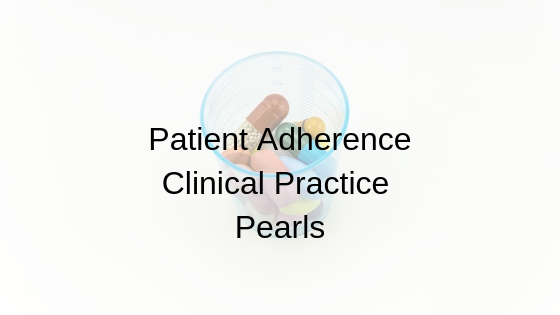Patient adherence is not the sexiest topic on the planet, but you must understand how prevalent this problem is. You can be the smartest clinician on the planet and select the most appropriate medication for your patient every time, but does it really matter if they don’t take it? I’ve put together some first hand lessons on patient adherence. Here’s my 7 tips that your patient is not taking their medication as you’d like them to.
Non-response
I’ve worked with a significant number of patients who have had resistant hypertension. As a pharmacist, I obviously watch closely for adverse effects from medications. Stimulants, decongestants, NSAIDs(podcast), and other medications can all raise blood pressure, but the first place I always start is adherence in a patient who is not responding to medication therapy. It is very seldom that a medication doesn’t do the trick in lowering blood pressure if it is actually taken.
Refill Records
If you continue to scratch your head as to why a patient doesn’t seem to be benefitting from a medication or they are continuing to come in with the same symptoms despite adequate treatment, phone a friend at the pharmacy. They can easily tell you when the medication was last refilled which can help you verify that the patient is actually taking the medication.
Complaining of Side Effects
Side effects are very prevalent in geriatrics. Patients who are numerous medications often have a hard time recognizing when a new adverse effect has begun and which medication to attribute it to. If you have a patient that has a complaint about possible side effects, you have to anticipate that the patient has quit taking the medication or at least reduced the dose or frequency on their own without telling you.
Why Am I On This?
When I visit with polypharmacy patients, they may not know exactly why they are on a medication. This is a good reason for them to quit taking it. Many medications can also have numerous indications that can confuse patients as to why they started it in the first place. TCA’s (podcast), gabapentin (podcast), and topiramate are a few examples of medications that have numerous potential indications. These are examples where I’ve seen where patients really aren’t sure as to why the medication was initially started.
Fear/Misinformation
Television commercials, TV shows, and neighbors with an opinion are everywhere. Patients listen and will become afraid of their medications. Some patients seem to be more prone to this than others. In my work as a pharmacist within a clinic, this is a patient population I work with frequently. Meeting with me gives them an opportunity to get reinforcement from what their primary provider is saying about the benefits and safety of a medication. Statins(podcast), hypertension, and diabetes medications are classic examples where patients will just stop taking them because they “heard” that long term use can cause serious problems. It is important to take the time to listen to their fears and explain to them some of the risks of not taking the medication. I always reassure patients that we can do labwork for many medications to assess safety (kidney, liver etc. – depending upon the medication).
Cost Concerns
If you ever have a patient that inquires about the cost of a procedure, service, or medication, you must recognize that they may be rationing or not taking their medication. Insulin (Novolog, Basaglar, Lantus, Levemir, Humalog, etc.), controller respiratory medications (Advair, Dulera, etc.), and newer diabetes medications (SGLT2’s, GLP-1’s, DPP), are common examples of really expensive medications that many cannot afford.
Device Education
I’ve had patients swear to me they are taking their medication, but yet symptoms appear to be getting worse or at least not improving. Patients struggle with respiratory devices. I remember one particular patient who was opening the Spiriva capsules and trying to dump the powder into the device. I also have heard of patients leaving the cap on their insulin needles (thinking that the needle would go through the cap enter their skin when the button was pushed). Many of these devices are not intuitive and many patients will forgo education at the pharmacy as they may not want to wait in line. Be sure to recognize medications that may have more complex administration procedures than just swallowing a pill.
Love the blog? Over 5,000 medication loving healthcare professionals are following! Get a Free Gift, simply for subscribing!
If you’d like more medication practice pearls like this, Eric Christianson, PharmD, BCGP, BCPS has written two Amazon Best Sellers for healthcare professionals: The Thrill of the Case and Pharmacotherapy.



0 Comments